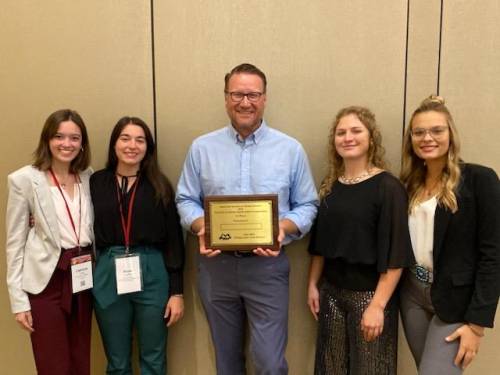
The Animal Sciences academic quadrathlon consists of a laboratory practicum, scientific presentation, written exam and quiz bowl. For the second year in a row, the MU Animal Sciences department has taken home gold in both the regional competition in Madison, Wis., and the national competition.
Each year, the animal sciences department holds a Mizzou level contest to decide what students will represent the university at the regional competition. Students, who are often offered extra credit by a professor to participate in the local competition, must form their own teams and study on their own, as coaching is not allowed at any level of the academic quadrathlon competition.
“We all kind of knew each other and decided at the last-minute to participate to get some extra credit,” said Alexia Sweiger. “We were right down to the wire of when you could register a team.”
Academic quadrathlon tests students over their entire college careers worth of course work, so studying can prove difficult. After qualifying for regionals, the MU team relied on their combined animal sciences experience and just a few refresher study materials.
“On the way to regionals in Madison we pulled up Quizlet to study together,” said Catriona Chew. “It was kind of a running joke that we were having such a good time participating, wouldn’t it be funny if we won?”
Regardless of the joke, the team quickly realized the quality of their animal sciences education from Mizzou. The written exam portion of the contest required the team to divide up the content and work together and is similar to a senior level animal sciences class final exam. Chew said the team always worked on the exam until the very end of their hour time limit, often trading sections to check each other’s answers.
“For the majority of the answers, we didn’t really have to learn any new content,” Sweiger said. “It was mostly going over things that we’ve heard in class before or had enough related knowledge to figure out.”
In addition to the exam, the students must complete a hands-on production animal practicum activity. At regionals, the team had to dissect and label a feeder pig. They were so excited and confident in their hands-on skills they forgot to put on their lab coats.
“It says as much about the program as it did about us to walk into something like that and feel as secure in the knowledge that we gained over our time at Mizzou,” Sweiger said.
Over the course of the three-day conference and competition, students devoted one evening to preparing a presentation on a hot topic in production animal agriculture to appeal to a specific audience. At nationals, the team had to present about how precision agriculture could impact western beef production.
“It promoted more thought, at least on my part, to consider the producer side, coming from the vet med track,” said Chew, a veterinary medicine student at Mizzou. “Normally in vet med we think from the side of science more than we do production, so that was a good learning opportunity for me.”
During the quiz bowl section of the competition, participants must show off their knowledge on stage in a good old-fashioned team quiz; audience, buzzers, and all.
“I think this experience has made me more confident in myself and my abilities,” said Aliyah Luntsford. “Going into veterinary school is a dauting task and I have been having bouts of imposter syndrome here and there. However, now that we’ve won a national championship, I feel a lot more at ease with myself and the future that lies ahead.”
The team also spoke about the benefits of learning from the other professionals at the ASAS conference and attending research symposiums and presentations in between the pieces of the competition.
“I think this experience just solidifies that I am on the right path and will make me a better student and a better practitioner in the future,” said Luntsford.
While coaching is not allowed for any of the competitors, the team praised the animal sciences staff for their other forms of support during the competition. Dr. Bryon Wiegand, division director of animal sciences, drove the team to ASAS in New Mexico to compete.
“It not only says a lot about the program to give students these opportunities, but also to have staff that’s willing to take time out of their busy schedules to attend the conference with us,” said Sweiger.
“Those four students are incredibly talented, and I’d put them up against anybody in that land grant space,” said Wiegand. “I think what makes it even richer is they put that team together on their own. They knew what their strengths and weaknesses were in different disciplines and then they showed that Tiger pride. We had a target on our backs from the win last year, and to win back-to-back with two different teams of students is kind of a big deal.”